Allan Wells 'took drugs ahead of gold medal win'
- Published
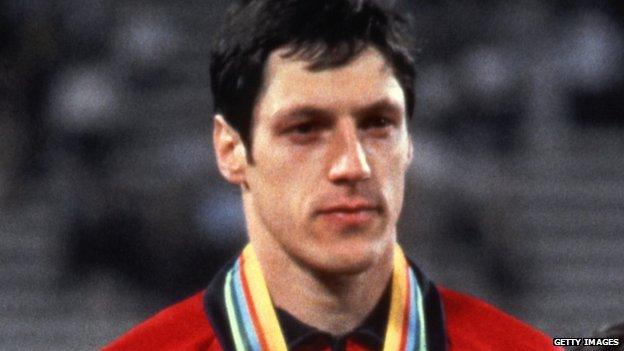
Allan Wells won the 100m at the Moscow Olympics in 1980
A BBC investigation has uncovered claims of drug taking by British 100m Olympic gold medallist Allan Wells.
Wells, who won the 100m in the Olympics in Moscow in 1980, is one of only three British athletes to win the elite race.
The allegations against him include the sworn testimony of three men who knew him well and secretly recorded exchanges with former Great Britain team doctor Jimmy Ledingham.
Allan Wells denied the allegations and attacked the BBC for a "shocking slur".
In the years since his victory, the Edinburgh sprinter, who is now 63, has been an outspoken critic of drug cheats, calling for lifetime bans.
However, the BBC documentary shown on Wednesday heard evidence that Wells was supplied with the anabolic steroid Stromba, or stanozalol, by Dr Ledingham.
Ledingham was an Edinburgh GP who had been involved with Scottish athletes since at least 1977. He was heavily involved with the British athletics team in the 1970s and 80s, including acting as its medical officer at the 1980 Olympics in Moscow.
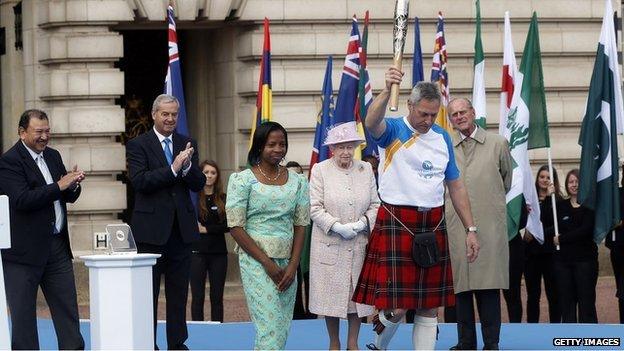
Wells was the first carrier of the Queen's Baton, ahead of the Glasgow Commonwealth Games last year
Drew McMaster, who won Commonwealth gold in 4 x 100m relay alongside Wells within the famous flying Scotsmen quartet - had secretly recorded conversations with Dr Ledingham, in which he apparently admitted supplying Wells with steroids.
The BBC has obtained some of the transcripts of those conversations, the full extent of which has never been broadcast before.
In one excerpt, Dr Ledingham - who died in 1998 - gave McMaster his reasons for doping athletes.
He said: "What I was doing it for was that I knew bloody well that the bloke standing next to you on the blocks was taking the stuff."
He was then asked if Allan Wells was also getting his steroids, or "stuff" from him.
Mark Daly has this exclusive report on doping claims
He said: "He [Wells] was taking stuff from all over the place, not just from me … Everybody knew Wells took drugs."
Dr Ledingham said he would never speak on the record about Wells, or any of the other …"half a dozen or so I've known to have taken things".
McMaster, who admitted taking steroids in 1995 after years of denials, told the BBC that athletes were coming from all over the UK to Dr Ledingham's surgery and said Wells was also a regular visitor.
McMaster said as well as specifically telling him that he was supplying Wells with steroids, Dr Ledingham also talked to him about drug testing procedures and how to avoid a positive test.
Allan Wells declined an interview with the BBC, but his lawyer said: "It is denied that any drugs were provided by Dr Jimmy Ledingham.
"It is not true our client had used any banned performance drugs…at any…time in his athletics career."
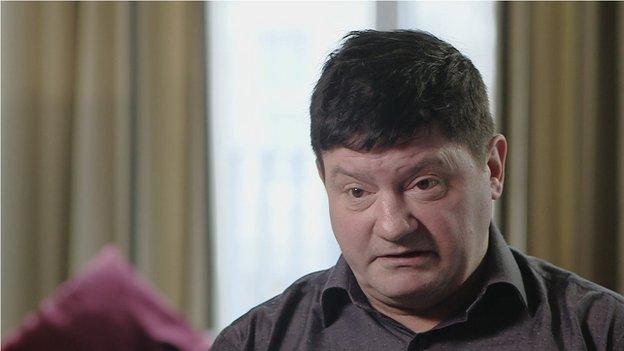
Drew McMaster won relay gold alongside Wells at the Commonwealth Games in Edmonton in 1978
Allan Wells has previously attacked McMaster for speaking publicly about drugs, saying: "The truth is, McMaster turned to steroids because I started beating him - and I was not using drugs."
Last week, Wells told the media: "None of [my] medals were achieved with the aid of illegal performance-enhancing substances. Training, exceptional coaching and a dedication and desire to win were my only driving forces."
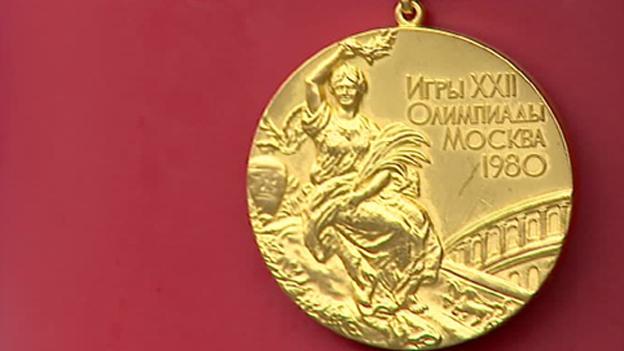
Allan Wells is one of only three British athletes to win Olympic gold in the 100m
Journalist Andrew Malone worked on a series of stories about drugs in athletics during the Wells era.
He said: "The fact that the Olympic team doctor was talking so openly about his knowledge of the use of drugs and the fact that he felt it was his duty to try and make sure people didn't harm themselves, I found that absolutely astonishing.
"An Olympic team doctor saying that he was aware of at least half a dozen athletes taking illegal drugs … it gave it a sense it was institutionalised."
The BBC spoke to a man involved in Scottish athletics who was close to Allan Wells and Dr Ledingham, who has never voiced his concerns publicly and wishes to remain anonymous.
He said he saw Wells transform from an unremarkable long jumper in 1976 into the one of the most powerful sprinters in the world, within two years.
He said: "I saw that Wells had this really big improvement in his performance. He suddenly started to run around six seconds dead for the 60 yards.
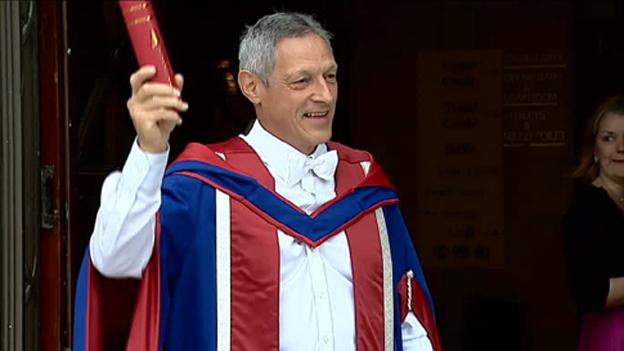
Wells has maintained a high profile, here receiving a honorary degree from Napier University in Edinburgh
"Can an athlete go from 11st 7 to 14st and put on that build naturally? Not at that age. Not in my experience.
"When I started to notice changes in him, the changes were big, and they were obvious. It changed his personality - a bit of aggression - that's the side effects of steroids.
"Once I had my suspicions, I spoke to Ledingham about it. He told me, he told me straight to my face that Allan Wells was getting Stromba from him."
Sworn statement
A former athlete who spoke to the BBC claimed detailed knowledge of Wells' alleged drug use.
He had given a sworn statement 20 years ago and told me, in a series of meetings, that his statement was true.
The athlete, who wants to remain anonymous, alleged that Wells told him he started using Stromba in 1977 and was being supported medically by Dr Ledingham.
He said that he and Wells compared notes about dosages, and when to come off the drug to beat the testers.
And he claimed that Wells admitted using steroids close to the final of the Moscow Olympics.
Some of the people the BBC spoke to about Allan Wells in this investigation are drugs cheats themselves.
As well as his gold, Wells also won silver in the 200m at the 1980 Moscow Olympic Games. He was the 100m world cup champion in 1981 and also scooped four Commonwealth gold medals.
He has maintained a high profile in the athletics world, acting as an ambassador for last year's Commonwealth Games in Glasgow and also given the honour of being the first carrier of the Queen's baton.
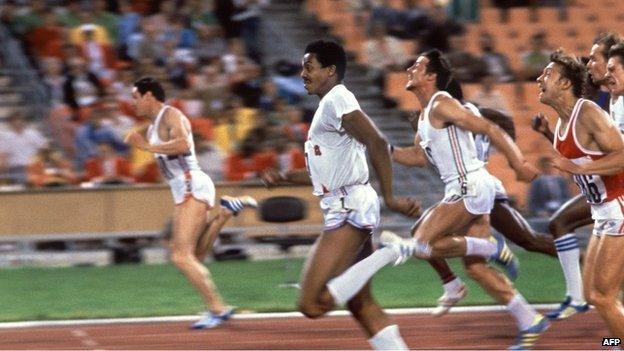
Allan Wells beat Cuba's Silvio Leonard to first place in the 100m in 1980
He has spoken out against drug cheats in the past, and once said he would sever ties with the British Olympic Association if the convicted doper Dwain Chambers was ever allowed to run for Britain at the Olympics again.
He told a journalist in 2004: "If you take a short cut to an Olympic gold medal then you deserve everything that happens to you."
Wells declined an interview with the BBC, but in a letter his lawyer said: "Allan Wells enjoys the highest of reputations … he has never failed a drug test [and] was subjected to the most rigorous and random drug testing regime applied to any athlete at that time."
Wells added: "I remember running in a major event in Europe on 2/7/1980 [three weeks before the 100m final in Moscow] where drug testing was taking place, as they regularly tested at this level."
Wells criticised the BBC over the allegations, describing them as a "shocking slur" and "gossip of the vilest kind", and said some of his teammates, including Drew McMaster, had been discredited by their own involvement in drug use.
He added: "I can look back with substantial pride on my individual achievements. None of these medals were achieved with the aid of illegal performance-enhancing substances. Training, exceptional coaching and a dedication and desire to win were my only driving forces."
Catch Me If You Can will be shown on BBC1 at 21:00 on Wednesday, and afterwards on the BBC iPlayer.